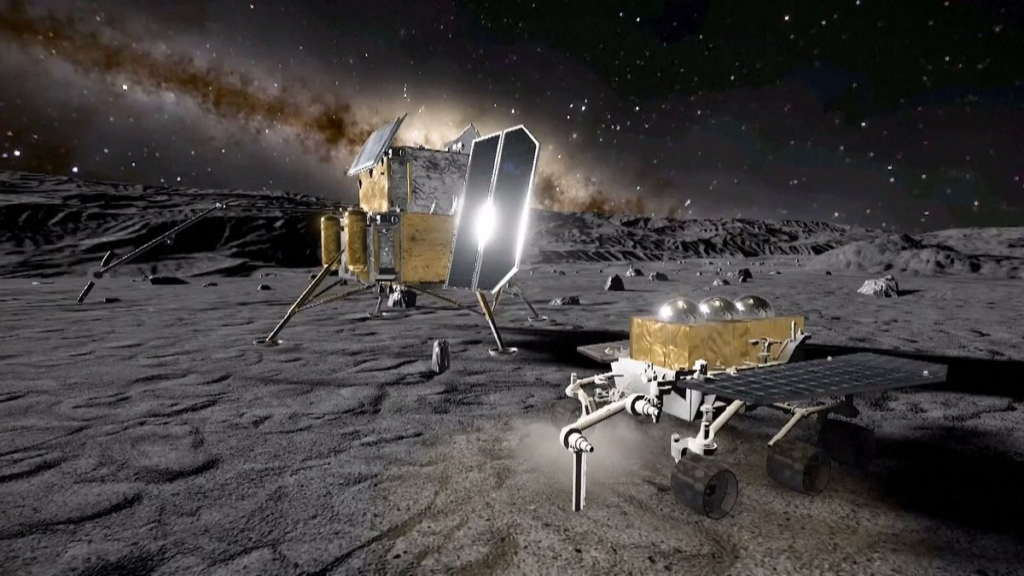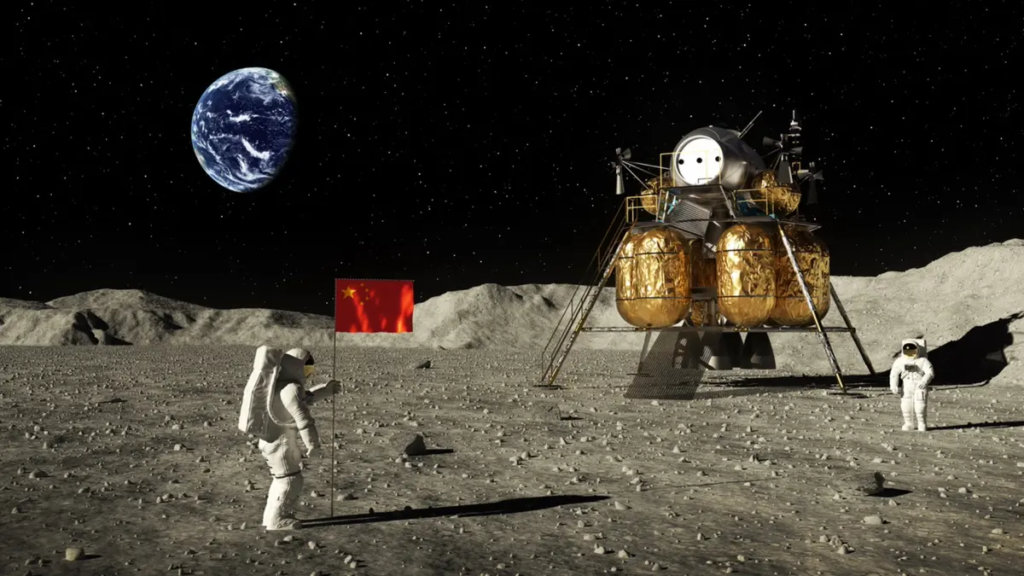China has announced ambitious plans to launch a manned lunar mission, construct a space station on Moon, and explore habitable planets and extraterrestrial life as part of a long-term expansion of its space program.
Unveiling a comprehensive mid- and long-term development plan, China’s space ambitions stretch from 2024 to 2050, with a focus on cementing the nation’s status as a global space leader.
China’s Expanding Space Program: Space Station on Moon
China has already made significant strides in space exploration, having successfully launched its own space station, Tiangong, which is currently in operation.
Additionally, China achieved a major breakthrough in lunar exploration by becoming the first country to collect samples from the far side of the Moon and return them to Earth for scientific analysis.
These achievements have been milestones in China’s rapidly evolving space program and are now set to serve as a foundation for even more ambitious goals in the coming decades.
The plan, unveiled by key space organizations including the China Academy of Sciences (CAS), the China National Space Administration (CNSA), and the China Manned Space Agency (CMSA), outlines a clear and structured roadmap that prioritizes 17 areas of focus under five broad scientific themes.
These themes range from the origin and evolution of the solar system to the search for extraterrestrial life. The plan also incorporates a three-phase approach, each building upon the previous achievements, to progressively advance China’s capabilities in space.
Read : Jaishankar’s Pakistan Visit Isn’t Sitting Well in China
The roadmap sets out distinct timelines for the country’s lunar ambitions. In the initial phase, running from 2024 to 2027, China will concentrate on operating its space station, advancing its manned lunar exploration mission, and pushing forward with the fourth phase of its lunar exploration program. This will include sending manned missions to the Moon and establishing a permanent foothold in lunar exploration.
Read : NATO Accuses China of Aiding Russia’s War on Ukraine
In the second phase, from 2028 to 2035, China will focus on constructing an international lunar research station. This lunar base is envisioned as a hub for future lunar exploration, serving as a platform for scientific research and international collaboration.
The third and final phase, stretching from 2036 to 2050, will further China’s efforts to establish itself as a major space power, with plans to explore beyond the Moon and into deep space, focusing on discovering habitable planets and searching for extraterrestrial life.
Lunar Mission and Space Station Construction
One of the most exciting aspects of China’s newly announced plan is its intention to send humans to the Moon and establish a space station on Moon by 2035. This ambitious goal is part of China’s larger vision to establish a sustainable presence on the Moon and potentially beyond.
Ding Chibiao, vice president of CAS, outlined these goals, emphasizing that the international lunar research station will be constructed during the second phase of China’s lunar exploration program.
The manned lunar mission, which will take place during the first phase of the program, will be a significant leap forward for China’s space capabilities. The mission is expected to further our understanding of the Moon’s surface, resources, and potential for supporting human life.
By focusing on the construction of a space station on Moon, China is aiming to create a long-term, sustainable presence on the Moon that can serve as a base for future exploration missions, scientific research, and perhaps even commercial endeavors.

The construction of the lunar research station is expected to take place from 2028 to 2035 and will involve cooperation with other international space agencies and partners. This collaboration is seen as a critical component of China’s space strategy, as it seeks to engage with global partners in advancing humanity’s knowledge of the Moon and the broader universe.
The station will likely serve as a key platform for lunar research, resource extraction, and even deeper space exploration. This move marks China’s serious commitment to long-term space exploration, positioning itself alongside the United States and Russia as a major player in space.
In contrast to other lunar missions, China’s approach emphasizes a permanent presence on the Moon, rather than a series of temporary missions. This permanent foothold will be crucial as China looks to push forward with further lunar research and exploration, including the possibility of mining lunar resources.
Exploring Habitable Planets and Searching for Extraterrestrial Life
China’s space ambitions are not limited to the Moon. The long-term plan also includes missions to explore the habitability of other celestial bodies within the solar system and beyond. This marks China’s entry into the race to discover habitable planets, a quest that has captured the attention of many space-faring nations in recent years.
In the first phase of the roadmap, which will last until 2027, China will focus on investigating exoplanets—planets that exist outside of our solar system—and determining whether they could support life.
Additionally, scientists will search for signs of extraterrestrial life, a pursuit that has fascinated astronomers and researchers for decades. China’s efforts in this area will include studying planetary atmospheres, searching for water or other key ingredients that could make a planet habitable, and identifying candidates for future exploration.
China’s space science priorities include understanding the origin and evolution of the solar system and its planets. Key areas of study will include the investigation of planetary atmospheres, the characterization of planetary bodies, and the search for extraterrestrial life.
By expanding its research into these areas, China hopes to contribute to our understanding of the universe and answer some of humanity’s most profound questions about life beyond Earth.

Another significant focus of China’s space science agenda is the study of the extreme universe. This theme encompasses a range of research areas, including exploring the origins of the universe, studying dark matter, and uncovering the physical laws that govern the universe under extreme conditions.
By investing in this research, China aims to push the boundaries of our knowledge of the cosmos and help answer questions about the nature of reality itself.
To further this research, China will conduct studies on medium to low-frequency gravitational waves and primordial gravitational waves, which are thought to hold key insights into the early universe.
These studies will also investigate the nature of gravity and space-time, as well as the interactions between the Sun and the Earth, to improve our understanding of the fundamental forces that shape the universe.
Expanding China’s Influence in Space Science
China’s space program has come a long way in the past two decades, evolving from a relatively modest venture into one of the most ambitious and well-funded space programs in the world. The latest announcement of China’s plans to build a space station on Moon and explore habitable planets underscores the nation’s commitment to advancing its space capabilities and expanding its influence in space science.
The goals outlined in the new program are bold and ambitious, but China has already demonstrated its capacity to achieve impressive milestones in space. The success of its space station, the first lunar sample return mission, and its growing collaboration with other space-faring nations all point to China’s potential to become a dominant player in the field of space exploration.
The international lunar research station, in particular, will likely serve as a critical hub for scientific research, enabling global collaboration and advancing our collective understanding of the Moon and beyond.

China’s space program has traditionally been seen as a rival to the United States and Russia, but the new plans emphasize a willingness to cooperate with international partners. As space exploration increasingly becomes a global endeavor, collaboration between nations will be essential to pushing the boundaries of what is possible.
By positioning itself as a leader in space science, China is not only advancing its own capabilities but also contributing to the collective knowledge of humanity as we venture deeper into the cosmos.
As we look to the future, it’s clear that China’s space ambitions will continue to grow. The nation’s investments in space science and technology are aimed at securing a leading role in the next era of space exploration, one that will likely involve deeper exploration of the solar system, the discovery of habitable planets, and perhaps even contact with extraterrestrial life.
For now, China’s bold plans for the Moon and beyond offer a glimpse into a future where space exploration is no longer limited to a handful of nations but becomes a truly global effort.

